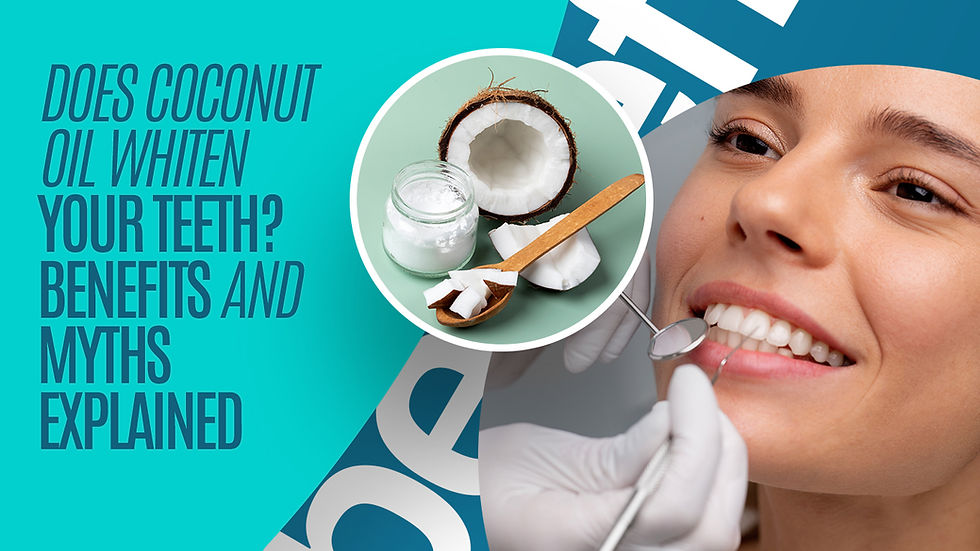Does Coconut Oil Whiten Your Teeth? Benefits and Myths Explained
- Vijay Ramasundaram
- 2 days ago
- 3 min read
In recent years, coconut oil has gained popularity as a natural remedy for various health concerns, including dental care. From oil pulling to direct application, many claim it can transform your smile. But does coconut oil actually whiten your teeth? Let's separate fact from fiction and explore what science says about this tropical treatment.

The Popularity of Coconut Oil for Teeth Whitening
Coconut oil has been used in traditional medicine for centuries, particularly in Ayurvedic practices originating in India. The technique of "oil pulling" – swishing oil in your mouth for 15-20 minutes – has seen a significant resurgence as people increasingly seek natural alternatives to chemical whitening treatments. Social media influencers and natural health advocates have further propelled its popularity, showcasing seemingly dramatic before-and-after results that have captured the attention of those looking for affordable home remedies.
The appeal is understandable – coconut oil is readily available, relatively inexpensive compared to professional whitening treatments, and free from the harsh chemicals that can cause sensitivity for some people. This combination of factors has led many to try coconut oil as their first step toward a brighter smile.
How Coconut Oil Might Help Your Teeth
Coconut oil contains lauric acid, which has antimicrobial properties that can help reduce harmful bacteria in the mouth. When used for oil pulling or applied directly to teeth, it may provide several benefits:
Remove surface stains by binding to plaque and bacteria that cause discoloration
Reduce inflammation in the gums, leading to better overall oral health
Decrease bad breath by eliminating odour-causing bacteria
Create a protective barrier that helps prevent new stains from forming
Improve overall oral hygiene when used consistently as part of a dental care routine
The mechanical action of swishing the oil may also help dislodge food particles and bacteria from hard-to-reach areas between teeth, providing a deeper clean than brushing alone might achieve.
The Scientific Evidence
While coconut oil has demonstrated benefits for oral health, the scientific evidence specifically for teeth whitening is limited. Most dental professionals acknowledge that coconut oil may help remove some surface stains, but it's unlikely to produce the dramatic whitening effects seen with professional treatments.
A 2015 study published in the Journal of Contemporary Dental Practice found that oil pulling with coconut oil reduced plaque formation and gingivitis, but didn't specifically address whitening effects.
Professional Teeth Whitening vs. Coconut Oil
If you're looking for significant whitening results, professional teeth whitening from a professional dentist will deliver more dramatic and immediate results. Professional treatments typically use:
Hydrogen peroxide or carbamide peroxide-based solutions
LED or laser light activation
Custom-fitted trays for at-home treatments
Carefully controlled applications to minimize sensitivity
These methods can lighten teeth by several shades in just one treatment, whereas coconut oil may only help remove some surface stains over extended use.
How to Try Coconut Oil for Your Teeth?
If you'd like to incorporate coconut oil into your oral care routine:
Use organic, cold-pressed coconut oil
Take 1-2 teaspoons of oil and swish it around your mouth for 15-20 minutes
Spit the oil into a trash can (not the sink, as it can clog drains)
Rinse your mouth thoroughly with water
Brush and floss as normal
Remember that this should supplement, not replace, regular brushing, flossing, and professional dental care.
Potential Risks and Considerations
While coconut oil is generally safe for most people, there are some considerations to keep in mind:
Those with coconut allergies should avoid this method
Prolonged oil pulling could potentially lead to jaw soreness for some individuals
Delaying professional dental care in favor of home remedies may allow dental issues to progress
Oil pulling is not recommended for children or those who have difficulty controlling their swallowing reflex
The Verdict: Helpful but Not Miraculous
So, does coconut oil whiten your teeth? The evidence suggests that while coconut oil may help remove some surface stains and improve overall oral health, it's not a replacement for professional teeth whitening treatments. For those seeking a more natural approach to dental care, coconut oil can be a beneficial addition to your routine, but don't expect dramatic whitening results.
When to See a Professional
If you're concerned about the colour of your teeth or are interested in significant whitening, consider consulting with us at Carrum Downs Dental Group. Professional teeth whitening services can provide safe, effective results under the supervision of trained dental professionals.
Regular dental check-ups remain essential for maintaining oral health, regardless of whether you incorporate coconut oil into your routine. We can provide personalized advice based on your specific dental needs and help you achieve the bright, healthy smile you desire.
For more information about teeth whitening options in Carrum Downs, reach out to us at Carrum Downs Dental Group and schedule a consultation. We will help you understand the best approach for your unique situation and guide you toward the most effective solutions for your smile.

Comments